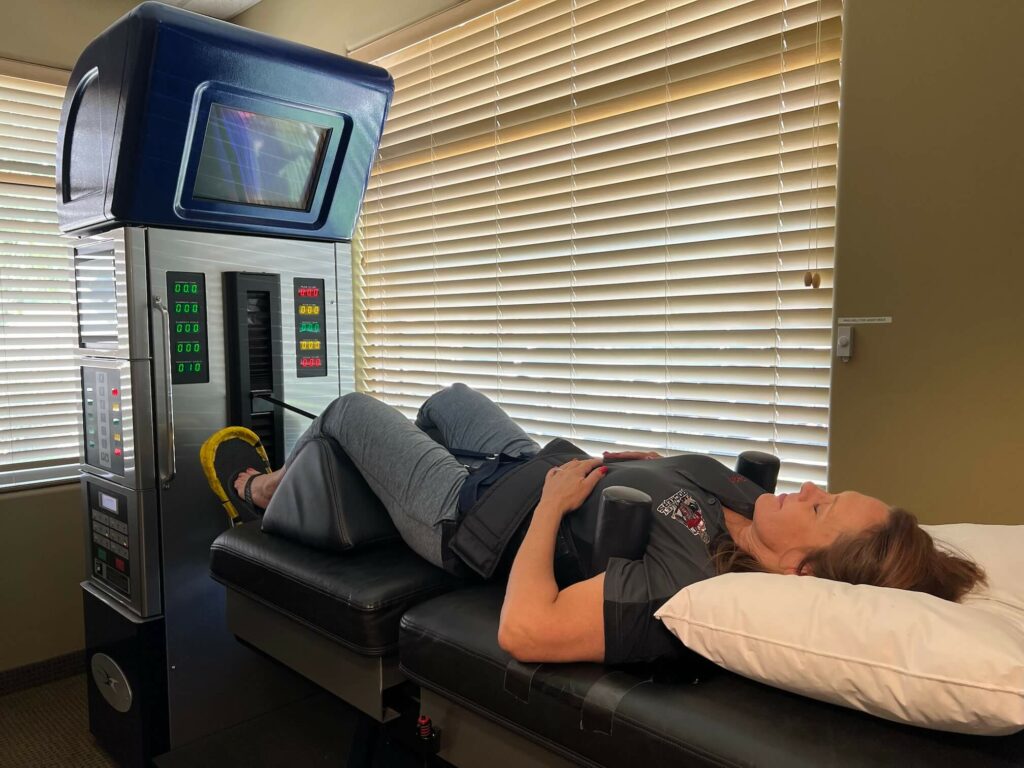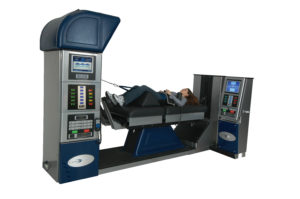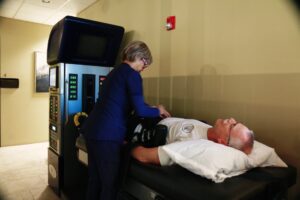Spinal Decompression Therapy in Scottsdale
Treat Your Chronic Spinal Pain with the Super Traction Decompression System in Scottsdale
Until the scientific and medical communities worked together to create the Super Traction Decompression (TDS) system, the only option for opening up space within the spine was invasive surgery. Thanks to the TDS system, we at LaserTech can help reduce the amount of pressure being placed on your spine by opening up space for the nerves to comfortably exit and function, so we can help minimize chronic pain associated with buckled ligaments, bulging or herniated discs or other spine-related condition.

With the advent of the FDA-cleared Super Traction Decompression system used here at LaserTech, treatment of spinal stenosis, herniated discs, sciatica, disc degeneration and/or failed back surgery has changed drastically, and for the better. Before, the only treatment options were to use highly addictive pain pills, which only mask the painful symptoms, or undergo potentially dangerous spinal surgery, but thanks to this spinal decompression treatment, you may be able to avoid all of these invasive options and still find relief through non-invasive means.
We are steadfast in our commitment to helping our Arizona patients find the pain relief they’ve been seeking for years. Check out our blog for a more in-depth look at Spinal Decompression Therapy.
Who is a Good Candidate for the Super Traction Spinal Decompression Treatment?

If you have been told by your doctor, chiropractor or any other health care professional that you may need surgery but you wish to avoid going under the knife, rest assured there’s still hope. If you’ve failed to find relief through other courses of treatment such as prescription medications, injections, chiropractic adjustments, physical therapy, etc., you’re not alone, and other options do exist. Call LaserTech today to schedule an appointment and get started on an alternative, non-invasive course of treatment today.
Ideal candidates for Spinal Decompression include those who suffer from pain associated with:
- Herniated Discs
- Degenerated Discs
- Spinal Stenosis
- Sciatica
- Chronic Back Pain
Other important factors include:
- You are at least 18 years of age
- You are available for at least four weeks of treatment protocols
- You experience chronic, or persistent, pain associated with degenerated discs, and other treatments have not given you the relief you seek
- You suffer from constant/recurring pain after undergoing a failed back or spinal surgery that was performed at least six months ago or longer
How Does the Spinal Decompression System (TDS) Work to Relieve or Eliminate Back Pain?
 The Super Traction Decompression system works to alleviate pressure and pain associated with a wide array of back and spinal conditions by applying an incredibly precise distraction force that effectively relieves nerve compression, which allows the material within your discs to pull away from the nerve and open up space for the nerves to pass through with ease.
The Super Traction Decompression system works to alleviate pressure and pain associated with a wide array of back and spinal conditions by applying an incredibly precise distraction force that effectively relieves nerve compression, which allows the material within your discs to pull away from the nerve and open up space for the nerves to pass through with ease.
Gone are the days when your only options were pain medications, refraining from physical activities, physical therapy or spinal surgery, as you now have a safe, viable and extremely effective, non-invasive alternative thanks to LaserTech’s TDS system. With this innovative technology, our pain relief team can safely and effectively reduce your neck pain associated with herniated or deteriorated discs, as well as lower back pain and sciatica, all without injections, pain medications or surgery.
Plus, our TDS treatment doesn’t only provide significant pain relief for the vast majority of patients, it also has helped many of them to return to healthier, more active and fulfilling lifestyles.
Does the Spinal Decompression Therapy Hurt? What Exactly Does it Feel Like?
LaserTech’s TDS treatment is both safe and comfortable. In fact, many patients are so relaxed, they’re able to sleep throughout the duration of the treatment, and do not experience any negative side effects. There have been some instances of mild muscle spasms that last for a very short period of time after the procedure, but these occurrences are few and far between.
Spinal Decompression Patient Testimonial
Frequently Asked Questions about Spinal Decompression
What is the success rate of spinal decompression therapy?
While every case is different, Spinal Decompression has a high success rate for helping patients with back pain and sciatica. If there is a window of opportunity to try to treat spinal stenosis or disc herniations non-surgically, this treatment has shown great promise and we have found our combination of other treatments compliment spinal decompression a help increase the odds of success.
What are the drawbacks/risks of spinal decompression?
Drawbacks and risks are minimal if you are qualified by the doctor to receive this treatment.
How long does it take for spinal decompression to work?
Our patients typically see results within 3-6 weeks. If there is no change by 6 weeks, we usually recommend discontinuing treatment.
Who is a good candidate for spinal decompression therapy?
A good candidate for spinal decompression is anyone with back pain or sciatica who doesn’t have associated progressive weakness, associated bowel or bladder complications, or any of the contraindications detailed below.
Who is NOT a good candidate for spinal decompression?
Contraindications for spinal decompression would include – Acute fractures; spinal fusion in the area of treatment; congenital spondylolysis or pars defect; severe osteoporosis; and an abdominal aneurism measuring greater than 3 centimeters.
Is spinal decompression therapy painful?
Spinal decompression treatments at LaserTech are safe and comfortable. Most patients tend to sleep throughout the treatment. Some patients might experience short-term mild soreness after treatment in the early stages.
How long does spinal decompression therapy last?
Each session takes just under 30 minutes. The goal of the treatment plan is to achieve sustainable relief.

